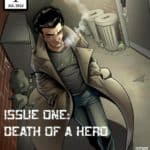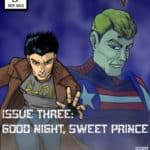
Story: C. B. Wright | Cover and Logo: Garth Graham
Part One: Obituary
ALEXANDER THOMAS MORGAN, 1920-2011. Soldier, hero, and humanitarian, he died at the age of 91.
Alexander Morgan, son of Ira and Adelle Morgan, born February 17, 1920 in Baltimore, MD. His father was a sailor and veteran of World War I. Morgan was raised to love his country, and had often said his father’s example instilled in him a desire to serve in the Armed Forces from a very early age. At the age of 18 he joined the Army, and immediately volunteered for the now-famous Project Paragon, the United States’ response to Germany’s Ubermann Initiative. As the most successful and visible “byproduct” of Project Paragon, he fought on the front lines against the Axis and became a rallying figure for many of the soldiers across all Allied forces, not just American, but British, French, even Russian.
During the war Morgan was promoted to Lieutenant and finally to Captain. After the war he intended to settle down, but it was at this point that the “atomic humans”—a phrase eventually replaced by the term “meta-humans”—began to emerge. Morgan found himself called out of civilian life in order to combat a new menace, this time largely civilian, consisting of atomic humans who used their abilities to gain wealth and power by force. Morgan resumed the mantle of Liberty and joined forces with the Living Flame, Titan, and the Whispering Man to form the Protectors, the first hero group to receive official government sanction.
This sanction proved to be short-lived. The House Un-American Activities Committee began to investigate charges that some self-styled heroes were communists, and while Liberty was never charged or investigated, the Whispering Man was called to testify. When the Whispering Man refused and turned vigilante, the Protectors were forced to disband.
It was during the post-Protector era that the effects of Project Paragon became apparent: Morgan was now in his late thirties but still had the physique of a man in his early twenties. By the 1960s it became apparent that his aging process had slowed drastically.
The 60s showed a decline in public opinion toward Morgan’s role as the hero Liberty. Changes in society and the emergence of the youth counterculture led to a growing distrust in authority figures, and Liberty was seen as part of “the system.” Still, even when his popularity was at its ebb he had unexpected admirers: Abbie Hoffman once said, “when you meet Liberty you remember why this America thing sounded like a good deal in the first place. Then you look around, and you realize he’s the only part of the deal that’s left.”
In the 60s and 70s Liberty took stances on social issues that, for a time, alienated him from the establishment he was so closely associated with. He supported the Civil Rights Movement, though he remained an outspoken critic of its militant fringes such as the Weathermen and the Black Panthers. He was deeply opposed to the Vietnam war, primarily because he felt the draft had been manipulated in a way that disproportionately chose the poor. His opposition to the war made him very unpopular with Presidents Lyndon Johnson and Richard Nixon. One of the more famous Nixon tapes features a nineteen-minute rant where the President accuses Liberty of collaborating with Jewish and Homosexual co-conspirators to undermine his presidency.
In the mid-70s, Liberty joined another hero group, the New Vanguard. The New Vanguard focused on disrupting the drug trade in New York City, and was responsible for thwarting a plot to destroy the United Nations by the Reichstaadt, a meta-human Neo-Nazi group. The New Vanguard disbanded in the early 80s, and Liberty resumed a career as a solo hero until he partnered with reformed villain Curveball for the last half of the 80s and through the 90s. In 1989, Liberty and Curveball joined the Guardians of Justice, another New York hero group led by Robert Thorpe, the high-tech hero Gladiator. The Guardians disbanded shortly after 9/11 when Thorpe refused to allow the newly-formed Department of Homeland Security to take control of the group.
After the Guardians disbanded, Morgan returned to civilian life and devoted himself to humanitarian work. He refused to make any public statements concerning the divisive and turbulent political division that characterized the first decade of the 21st century.
Morgan is survived by two children, Juliet and Alexander Jr, five grandchildren, and fourteen great-grandchildren.
A private memorial service will be held for family and close friends, with a public service following. The family requests that in lieu of flowers or other sympathy offerings, donations be made to the American Legion.


